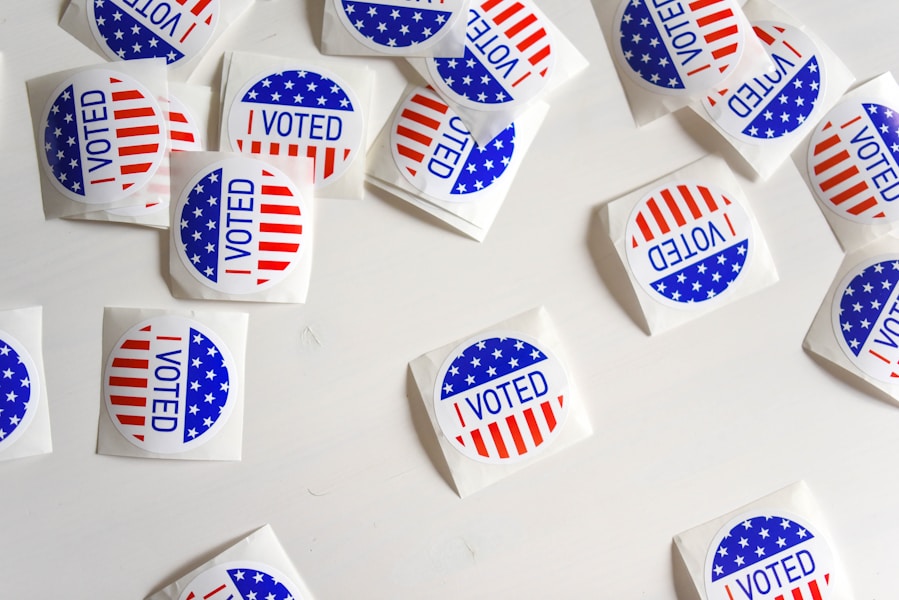On the debate stage Tuesday, former president Donald Trump reiterated the widely debunked claim that he won the 2020 election. Less than two months from election day, state officials in Ohio and Republican leaders in Congress appear to be laying the groundwork for future claims of fraud if Trump loses in November, an election watchdog is warning.
Failed SAVE
With a federal funding deadline looming, House Speaker Mike Johnson wanted to tie the SAVE Act to government funding legislation. The measure, which passed the House already this year, would require voters across the country to show proof of citizenship before registering to vote.
Although it’s already illegal to register or vote when you aren’t eligible, under current law a voter only has to attest to being a citizen. Requiring documentary proof of citizenship is a lot more complicated than it might seem. Go-to documents like a driver’s license or a Social Security card wouldn’t cut it. Even a birth certificate would be insufficient without a photo ID showing a matching name, which is a potential complication for those who changed their name after marriage.
A University of Maryland study estimates more than 21 million Americans don’t have ready access to the documents they’d need.
And the catch is even if Speaker Johnson could find the votes he did previously for the SAVE Act, and force the hand of the U.S. Senate where the measure was dead on arrival, its passage would have no impact on November’s election.
That led even a SAVE Act co-sponsor to revolt. On social media, Trump urged lawmakers to shut down the government unless they get “absolute assurances” of election security before voting on a funding measure. He then alleged, without evidence, that Democrats are attempting to register undocumented people.
David Becker, from the Center for Election Innovation and Research, made the point that it’s too late for the SAVE Act’s provisions to affect the upcoming election.
“I think there’s an important question to ask, and that question is, why now?” he said. “Why are you raising this now, even if we take what you say as truth, and in most cases, it isn’t, why didn’t you do something about this before?”
He noted Republicans have controlled the U.S. House since the beginning of 2023 (the SAVE Act vote was about two months ago) and Trump was in the White House for four years.
“This is about politics,” he added, “and more importantly, it’s about fueling perceived claims of an election being stolen in anticipation of what they may believe is going to be a defeat for their preferred candidate.”
Wednesday afternoon, Speaker Johnson announced he would delay the vote on a funding bill while he works to shore up support.
What’s happening in Ohio
A bit closer to home, Ohio Secretary of State Frank LaRose is working in the same vein. He’s recently urged state lawmakers to impose similar proof-of-citizenship requirements at the state level following a U.S. Supreme Court ruling allowing an Arizona law to remain in place. And Wednesday he called on Congress to support his efforts to find alleged noncitizens on the voter rolls.
Earlier this week he referred old cases to the Attorney General. Since taking office, LaRose stated in a press release, his office has sent more than 600 incidents of alleged election fraud to law enforcement.
An Ohio Capital Journal investigation showed almost none of those allegations have resulted in charges, and LaRose’s release acknowledges that track record. But instead of seeing shortcomings on his end, LaRose placed the blame on county prosecutors.
“Unfortunately, many of these referrals have not been pursued by law enforcement, sometimes by choice and other times due to limited prosecutorial capacity,” he said.
LaRose noted the Attorney General can step in when a prosecutor doesn’t act “within a reasonable time,” and insisted “the only way to maintain Ohio’s high standard of election integrity is to enforce the law whenever it’s broken.” Hun Yi, who leads investigations for LaRose’s public integrity division, argued prosecutors have had their chance.
“We respect prosecutorial discretion,” he wrote in a letter to Attorney General Dave Yost, “and we don’t necessarily expect all 633 referrals to lead to criminal charges, but only 12 out of 633 shows a second set of eyes might be needed here to determine whether prosecution of these crimes is justified.”
The referral of warmed-over cases comes on the heels of two other noncitizen audits in which LaRose wound up flagging recently naturalized citizens. Some of them argue LaRose’s audit took a shortcut — lumping them in even though they hadn’t made a legally required assertion of noncitizenship to the BMV.
Becker argued that heightened scrutiny is simply not warranted.
“Disenfranchising citizens is wrong,” he said. “It’s particularly troubling to disenfranchise citizens who become naturalized and as their first act as a naturalized citizen registered to vote.”
“So, until they bring any evidence,” he added, “I think we don’t have anything to discuss here. Because this is not a problem.”
Ohio Capital Journal is part of States Newsroom, a nonprofit news network supported by grants and a coalition of donors as a 501c(3) public charity. Ohio Capital Journal maintains editorial independence. Contact Editor David Dewitt for questions: [email protected]. Follow Ohio Capital Journal on Facebook and X.






